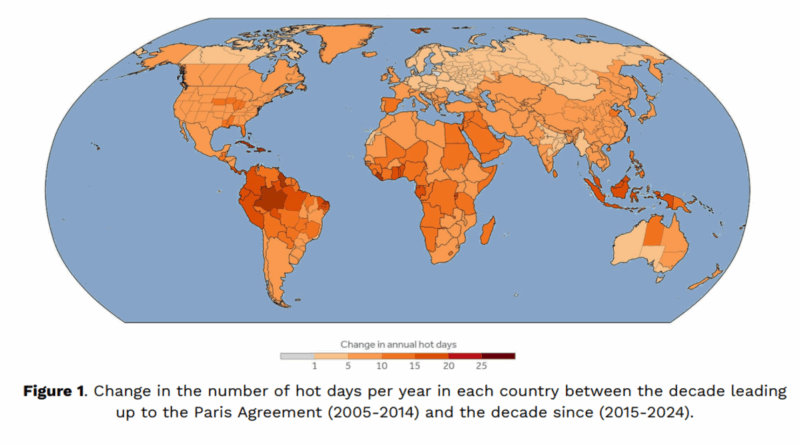Recent research from Climate Central and World Weather Attribution indicates that the Paris climate accords have been somewhat successful in mitigating global heating. Without these agreements, the planet would be on track for an alarming average temperature rise of 4°C. Thanks to the framework established by the accords, this increase is now projected to be “only” 2.6°C.
The Paris Agreement, adopted in 2015, enables each signatory nation to set its own emission reduction targets through mechanisms known as Nationally Determined Contributions (NDCs). The aim was to submit and update these plans as nations make progress in reducing their greenhouse gas emissions.
The signatories committed to addressing climate change while respecting various human rights and promoting gender equality. Despite some progress in emission reductions, a substantial gap remains between current pledges and the necessary cuts to limit the global temperature rise to 1.5°C this century. According to World Weather Attribution, many countries are not on track to meet even these existing commitments.
Climate Central summarized the findings, stating that the Paris Agreement provides a vital legal and political framework for a safer and more equitable world. While projected warming has decreased from approximately 4°C in 2015 to 2.6°C if current pledges are fully executed, this level of warming still poses significant dangers. Each fraction of a degree in temperature rise contributes to more frequent and severe heat events.
For instance, since 2015, the world has experienced an average increase of 11 additional hot days per year due to a rise of 0.3°C. In a scenario where the temperature increases to 2.6°C, this could escalate to 57 extra hot days annually. At 4°C, the number of additional hot days could reach 114 per year.
The study highlights that extreme heat events have become more frequent since 2015. Of the six heat events analyzed, three would have been nearly impossible without climate change, and two of these events are now projected to be about ten times more likely to occur in 2025 than in 2015.
Despite the expansion of heat early warning systems and action plans globally since 2015, the pace of progress remains inadequate, hindered by limited funding for local adaptation efforts. The financial burden of inaction on extreme heat is escalating, affecting health, labor, and infrastructure, with the most vulnerable populations facing the greatest risks.
The anticipated warming this century continues to far exceed the goals set in the Paris Agreement. Achieving deep, rapid, and sustained reductions in emissions is now more critical than ever. “There will be pain and suffering because of climate change,” said Kristina Dahl, Vice President for Science at Climate Central and co-author of the report. She noted the importance of the difference between 4°C and 2.6°C in terms of human ambition and effort over the past decade.
The study defines “super-hot days” as those warmer than 90% of comparable dates from 1991 to 2020. The increase in super-hot days since 2015 highlights a growing public health crisis. Dahl emphasized, “That heat sends people to the emergency room. Heat kills people.” Although the report does not specify how many individuals will be affected by the additional hot days, co-author Friederike Otto from Imperial College London indicated that it could involve tens of thousands or even millions of people.
Supporting this assessment, research from the International Institute for Environment and Development shows that many cities worldwide are already facing more extreme heat days. In 2024, the total number of days exceeding 35°C was 1,612, which is 52% higher than recorded in 1994. The average number of days over 35°C has risen from 1,062 annually between 1994 and 2003 to 1,335 from 2015 to 2024.
Extreme heat, driven by fossil fuel combustion, intensifies every heatwave. The Guardian reported that such climate change has likely resulted in the premature deaths of millions over the past three decades, disproportionately affecting vulnerable populations in rapidly growing urban areas.
The study also assessed the heatwave that affected southern Europe in 2023, finding it was 70% more likely and 0.6°C warmer than it would have been a decade ago. Without more robust climate action, similar heatwaves in the future could be 3°C hotter.
The report highlights that the effects of global warming will disproportionately impact developing nations that historically contribute little to greenhouse gas emissions. Andrew Weaver, a climate scientist from the University of Victoria, remarked, “This report beautifully quantifies what we’ve been saying for decades. The impacts of global warming are going to disproportionately affect developing nations.”
Countries such as the Solomon Islands, Samoa, and Panama are expected to experience the most significant increases in dangerous heat days. Panama, for instance, could see an additional 149 super-hot days, despite contributing only 1% of global emissions.
In the United States, Florida and Hawaii are projected to experience the largest rise in super-hot days by the end of the century, while states like Idaho may see a smaller increase. This situation raises concerns about the implications of political decisions, particularly in states like Florida, where official acknowledgment of climate change is often avoided.
The findings underscore the urgent need for immediate and ambitious actions to combat climate change, particularly as the world prepares for discussions at COP 30 in Brazil this November. The future of global climate policy hinges on sustained efforts to meet the targets set by the Paris Agreement, ensuring that the impacts of climate change do not continue to exacerbate existing inequalities.







